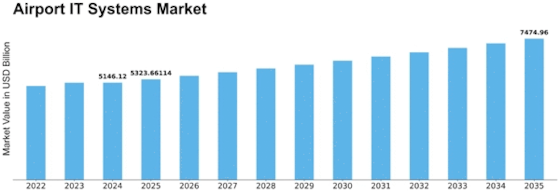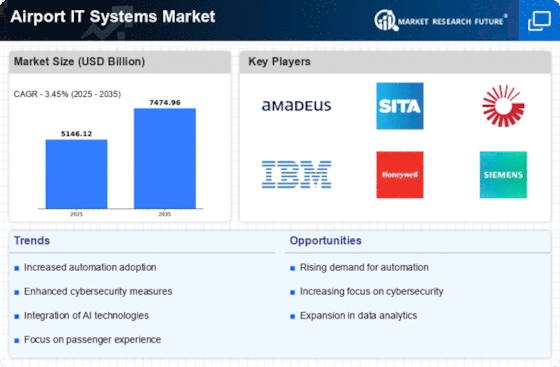Airport It Systems Size
Airport IT Systems Market Growth Projections and Opportunities
The Airport IT Systems market is influenced by various factors that shape its dynamics and growth potential. One of the primary drivers of this market is the increasing demand for efficient and passenger-friendly airport operations. As air travel continues to grow globally, airports are under pressure to enhance their infrastructure and services to accommodate rising passenger volumes and improve the overall travel experience. In response, airport operators are investing in advanced IT systems to streamline operations, optimize resource allocation, and enhance passenger services such as check-in, baggage handling, security screening, and flight information management.
Moreover, technological advancements play a pivotal role in driving the growth of the Airport IT Systems market. The evolution of digital technologies, including cloud computing, big data analytics, artificial intelligence, and Internet of Things (IoT), has revolutionized airport operations and management. Advanced IT systems enable airports to collect, analyze, and leverage vast amounts of data to optimize resource utilization, improve operational efficiency, and enhance passenger experience. From predictive maintenance to real-time passenger flow management, these technologies enable airports to operate more efficiently and cost-effectively, driving demand for innovative IT solutions.
Additionally, regulatory compliance and security requirements are significant factors shaping the Airport IT Systems market. Airports are subject to stringent regulations and security standards imposed by aviation authorities and government agencies to ensure safety, security, and regulatory compliance. Compliance with regulations such as ICAO (International Civil Aviation Organization) standards, TSA (Transportation Security Administration) requirements, and GDPR (General Data Protection Regulation) mandates is essential for airport operators to maintain operational integrity and passenger trust. As regulatory requirements evolve and become more complex, airports require robust IT systems capable of supporting compliance efforts and ensuring data security and privacy.
Furthermore, the trend towards digital transformation and passenger-centricity is driving innovation and investment in Airport IT Systems. As passengers increasingly demand seamless travel experiences and personalized services, airports are investing in digital technologies to enhance passenger engagement, loyalty, and satisfaction. From mobile apps for self-service check-in to biometric authentication for expedited security screening, airports are leveraging IT systems to deliver personalized and frictionless experiences throughout the passenger journey. By embracing digital transformation, airports can differentiate themselves, attract more passengers, and generate additional revenue streams, driving demand for innovative IT solutions and services.
Moreover, globalization and air traffic growth are key market factors influencing the Airport IT Systems market. As air travel continues to grow worldwide, airports are facing increasing pressure to handle higher passenger volumes, accommodate larger aircraft, and manage more complex operations. To meet these challenges, airports require advanced IT systems that can scale to support growing demand, optimize capacity utilization, and improve operational efficiency. From airport management systems to air traffic control solutions, IT systems play a critical role in enabling airports to manage and optimize their operations in a rapidly changing and competitive environment.



















Leave a Comment